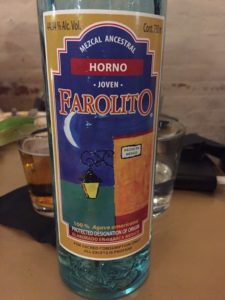Farolito Papalometl is made with agave Papalometl (potatorum) in Santa Maria Ixcatlan, Oaxaca. Once cooked and crushed, the agave is fermented in what are essentially cow hides, or “bovine leather,” which are large cow hides that can be used and reused for years on end. Once fermented, it is double-distilled in small clay pots.
Farolito Penca Verde (which translates into green apple) is made with agave Penca Verde. On the bottle it is labeled as ‘Agave Sp’ which means it is an unclassified species. This mezcal is made by maestro mezcalero Valentin Celis in Zimatlan, Oaxaca. Once cooked and crushed, the agave is fermented in clay pots, and then distilled in a small clay pot still. A different batch of this was imported into the US in 2014 under the Wahaka VdM brand.













 Gerry Furth-Sides
Gerry Furth-Sides  Barbara Hansen
Barbara Hansen  Chef-owner Alain Cohen
Chef-owner Alain Cohen  Roberta Deen
Roberta Deen  Jose Martinez
Jose Martinez  Nivedita Basu
Nivedita Basu